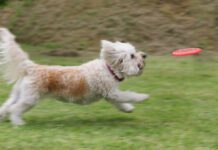I suspect we’ve all been there, maybe more than once: your dog is off playing and acts like he’s lost his hearing completely: you call his name—over and over—but he pays absolutely no attention. Or maybe he gets so excited that he seems to be bouncing off the walls, and there’s nothing you can do to calm him down. Or even after hours of training, he still jumps up on visitors when he first sees them.
At times like these, when you’re ready to tear out your hair in frustration, you may have wondered if it’s possible that your dog has ADHD…because he’s sure acting like it.
What is ADHD?
Attention-deficit hyperactivity disorder (ADHD) is a highly inheritable, neurodevelopmental disorder characterized by symptoms including overactivity, impulsivity, and inattention. It usually exhibits in early childhood, can persist into adulthood, and can occur alongside other disorders such as anxiety and learning impairment.
So, could your dog have ADHD?
No, not really. ADHD as a disorder is exclusive to human beings. However, dogs can exhibit behaviors that mimic ADHD: inattention, hyperactivity, and impulsivity.
ADHD-Like Behaviors in Dogs
Some experts have referred to ADHD-like behaviors in dogs as hyperkinesis or hypersensitivity–hyperactivity disorder. Today, many in the scientific establishment use the term ”ADHD-like” due to its similarity with ADHD in humans. Research has shown that up to 20 percent of dogs show high levels of these traits.
Dogs with ADHD-like behaviors may exhibit all of them simultaneously or may display one rather than another: they may be predominantly impulsive, predominantly hyperactive, predominantly inattentive, or may present with a blend of all three. The most problematic characteristic of the ADHD-like behavior in dogs is generally considered to be hyperactivity and/or impulsivity, resulting in difficulty staying still, excessive barking or vocalization, constant movement, obsession with play, extreme destructive tendencies, lack of self-control, and difficulty interacting with humans and other dogs. These behavioral symptoms are frequent enough that the quality of life of both the dog and its caretaker are affected.
The Role of Genetics, Living Conditions, and Physiology In ADHD-Like Behaviors in Dogs
In 2020, researchers in Finland studied over 13,000 dogs to determine their levels of ADHD-like behavior, and made some remarkable discoveries. In a nutshell, the study revealed that a combination of genetics, physiology and living environment contribute to a dog’s susceptibility to exhibit ADHD-like behaviors. As is the case with humans, ADHD-like behavior in dogs depends in large measure on the interaction between genes and environment.
Genetics
In humans, ADHD is associated with a disruption in various neurotransmitters such as serotonin, dopamine, and norepinephrine. Studies suggest that the origin of canine behaviors that resemble human ADHD could be very similar. For instance, in humans the neurotransmitter serotonin is involved in regulating our mood and emotions; altered serotonin transmission in humans with ADHD can be related to conditions such as obsessive–compulsive disorder, aggression, and major depression and/or anxiety. In dogs, low serotonin is associated with aggression, impulsiveness, fear, and ADHD-like behavior. Another example is dopamine: in humans, dopamine plays a critical role in attention and cognition. In dogs, abnormal dopamine levels are related to problems of aggression, impulsivity, attention deficits, and/or general nervousness.
Recent studies have shown that dogs with impulsive, hyperactive, and aggressive behaviors have low serotonin and dopamine levels in their urine, as well as low levels of serotonin in their blood. One study focused on English Cocker Spaniels—a breed often associated with idiopathic aggression—with genetic analysis finding that aggressive spaniels had significantly lower levels of serum serotonin than aggressive dogs of other breeds.
We also know that some dogs have been selectively bred to perform high-energy tasks: among them are hunting dogs, working breeds such as herding dogs, and terriers. The characteristics of these breeds such as high activity, excitability, and reactivity are inevitably passed down from one generation to the next through these dogs’ genes.
Living Conditions and Environment
Research shows that lack of socialization, especially in puppies, the use of punishment or aversive training techniques, limited nurturing from caregivers, and spending long periods of time alone are associated with ADHD-like behaviors in dogs. Dogs exercised irregularly or infrequently and those not exposed to outside activities and training tend to be more hyperactive and inattentive although it should be noted that the reverse can be true: hyperactivity and low attention levels could be due to a lack of exercise and/or training. This is just one limitation of canine research, in that unlike with human subjects, researchers can’t directly access a dog’s feelings. (Scientists aren’t the only ones who wish they could!)
Physiology
A dog’s age tends to be a major contributor to the prevalence of hyperactivity, impulsiveness, and inattention, with these behaviors being more common in young dogs. Unfortunately, even though this is a lifelong neurodevelopmental disorder, no longitudinal studies on ADHD-like conditions in dogs have ever been done.
As a rule, male dogs tend to develop ADHD-like conditions more frequently than females; the results are much less conclusive, however, when it comes to intact versus neutered males. Some studies found that intact dogs were more prone to ADHD-like behaviors, while others pointed to castrated dogs being more susceptible.
The Role of Breed
Numerous studies have shown that some breeds have a propensity for ADHD-like behaviors. Working dogs like German Shepherds and terriers show the highest levels of hyperactivity and impulsivity, whereas breeds with the highest levels of inattention were terriers, Golden Retrievers, and Chinese Crested dogs. Border Collies were an interesting mix, exhibiting very high levels of hyperactivity and impulsivity, but low measures of inattention. The most impulsive breeds were found to be terriers, German Shepherds, Labrador Retrievers, and Border Collies; the least impulsive were Standard Poodles, Golden Retrievers, and Shetland Sheepdogs.
It must be remembered, however, that breed is not determinative, nor is it all-encompassing. Again, each individual dog’s life experiences (especially those forged in puppyhood), environment, and socialization all contribute to their characteristics and behavior.
Treating ADHD-Like Behavior in Dogs
First and foremost, if you suspect that your dog may have the canine equivalent of ADHD, talk with your veterinarian to rule out any medical or health issues. If it’s determined that the dog’s behavior may be related to an ADHD-like condition, your vet may direct you to a behaviorist for further evaluation. That being said, be aware that no clear consensus exists for the diagnosis of canine ADHD in veterinary medicine. At the same time, there are no guidelines for ADHD-like behavior modification therapy or published studies showing the effectiveness of any behavior-modification treatment regimen.
That is not the case, however, with the use of pharmaceuticals. Veterinary specialists have found that dogs with ADHD-like problems respond to the same medication used to treat ADHD in humans. In particular, selective serotonin reuptake inhibitors (SSRIs) or tricyclic antidepressants are often recommended if aggression is a factor. Fluoxetine (Prozac) has been shown to be quite beneficial in cases of hyperactivity and is often considered a first-line treatment for ADHD-like conditions in dogs.
Clearly, there is a need for much more research into ADHD-like behavior in dogs, particularly with regard to effective treatments. The symptoms of ADHD in humans were initially described in the 16th century, and the first medication to treat the condition dates back to 1955. But it wasn’t until 1973 that the first study on what we now call ADHD-like behaviors in dogs was conducted, and the first experimental use of fluoxetine for dogs didn’t take place until 1993.
However, thanks to continued research into how dogs with this condition can be a powerful model for humans with ADHD, we may soon be able to offer our canine companions even more in the way of effective treatment for this debilitating condition.






One should also take the dog’s birth chart into consideration. Our new 4 month old pup is German Shepherd/Husky(56%), Border Collie/Cattle Dog and a Gemini! Her whole litter was at the 2 hr from us ASPCA. I found them online. Someone at the shelter named them all after planets and since I was having myk 12 year Jupiter return in Cancer, I knew we had to adopt the one named Jupiter. Too synchronistic not to. She was WILD in the playroom- and they even said she was the most hyper and would we like to adopt a different member of the litter. I stuck with Jupiter. She’s still a bit ADHD, hyper etc. but we take them (have a 4 yr old) for their morning off leash hike/snowshoe (about an hour to hour 1/2), she’s fine, less hyper. I believe dogs (like people) need an hour of outdoor exercise as close to daily as possible. I just ordered a new raincoat/rainpants set from REI. My 30 yr old pair is leaking. Jupiter had to learn to ‘focus’ her attention and thinking just like any other more hyper breed. It just took about 3-4 weeks. You have to change YOUR life to adopt any dog(s)! That’s your responsibility. I’m 71 and have had dogs since I was 19, 2 at a time. That also helps- having 2 at a time. I worked in special ed for 40+ years and also found having 2 kids in therapy at a time was the best # for teaching kids how to direct their attention/energy (as a speech-language pathologist). Imagine working with 2-3 yr old kids diagnosed with ADHD. It’s second nature to me.
Encouraging and salient advice. We have had dogs dince my early adolescence. Each one different, each one a love of my life. All have “calmed down” over time. Our current love is a Cavipoo (3 yrs old). He cracks me up as he carefully watches TV. He growls at all politicians and barks at the Farmers Dog commercials. He is a loving lap sitter. Just returned from an 18 day trip to Asia. Our reunion was awesome.
Thsnks for sharing your wisdom.
Why not consider homeopathy?
Any connection to the shot, and the ingredients in the shots like humans???????
Folic acid deficiency or downstream metabolite genetic defect of utilization may be a consideration. Folic acid supplementation has resulted in improvement in many dogs.
The same has been true for ADHD children, especially those with a MTHF genetic defect.